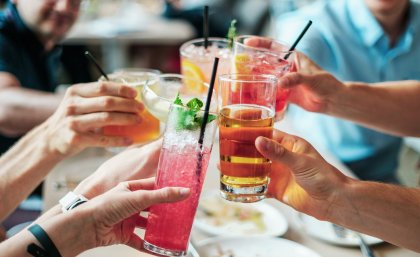
Instead of slowing down, New Zealanders appear to increase their pre-drinking after the age of 30, a University of Queensland study has found.
Researchers explored the international pre-drinking habits of a convenient sample of respondents from 27 countries to determine the role of sex and age on the behaviour.
UQ Centre for Health Services Research expert Dr Cheneal Puljevic said New Zealand wasn’t the only country seeing an increase in pre-drinking after 30.
“We expected to see pre-drinking peak at the age of 21 and then decline, but this wasn’t true of every country,” Dr Puljevic said.
“Pre-drinking appears to increase again after the age of 30 in Brazil, Canada, England, Ireland, New Zealand, and the United States; this was the typical pattern for both men and women.
“The pre-drinking behaviour among the over-30s, we suspect, could be due to people meeting up for one to two drinks at home before they go out for dinner or to a bar.
“What we found interesting, is that pre-drinking varied between countries and more so, by both age and sex.”
Greece recorded the lowest uptake (17.8 per cent) compared to Ireland’s highest uptake (85.6 per cent), while Australia remained towards the top end of the scale at 61.4 per cent.
“In Mediterranean countries like Greece and Italy, many people have a different relationship with alcohol because they’re drinking with dinner most nights,” Dr Puljevic said.
“Yet, by age and sex, we see little variation in the percentage of pre-drinkers in Greece, while we see a decline in the percentage of pre-drinkers across the ages in Italy.
“In countries like Ireland and Australia, many people are less likely to drink during the week, but then may pre-drink before a big night out on the weekend.
Dr Puljevic said the gender split between those who pre-drink before going out and those who don’t was less defined than expected.
“We expected to see substantially more males engage in the behaviour than females; this was true of all countries except Canada and Denmark,” she said.
“In these countries, women were more likely to pre-drink than their counterparts. In Denmark this was especially true for respondents between 16-24 years of age.
“We don’t know why exactly. Some research suggests women are pre-drinking to match the intoxication levels of males.
“Women also often prefer socialising in groups and getting together before going out, which could contribute to the behaviour.”
Pre-drinking can lead to revellers drinking more alcohol and experiencing heightened adverse effects.
“This is an issue of global concern due to evidence linking pre-drinking with increased risk of assaults, injuries and arrest,” Dr Puljevic said.
“Interventions aimed at reducing pre-drinking need to be targeted at a range of ages and both sexes, not just young males who go out to nightclubs.
“It raises some questions about public health policies that aim to increase the price of alcohol in nightclubs and bars.
“These policies have some unintended consequences. Instead of consuming alcohol over the course of a night and intoxication levels rising at a steady rate, many pre-drinkers are arriving at venues already intoxicated and drinking more.”
This research has been published in Alcohol and Alcoholism (DOI: doi.org/10.1093/alcalc/agz040)
Media: Dr Cheneal Puljevic, c.puljevic@uq.edu.au; Faculty of Medicine Communications, med.media@uq.edu.au, +61 7 3365 5118.
.jpg)









